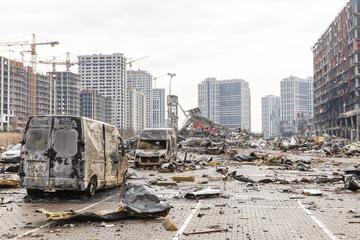UKRAINE EXPERT COMMENT, ONE YEAR ON

UKRAINE EXPERT COMMENT, ONE YEAR ON
Why did Russia invade Ukraine and who knew it would be so resolute, asks Dr Marnie Howlett, departmental lecturer in Russian and East European Politics in Oxford’s Department of Politics and IR (DPIR) and the Oxford School of Global and Area Studies (OSGA).
Published: 24 February 2023
Author: Dr Marnie Howlett
Share this article
Many explanations have been given for why Vladimir Putin decided to launch an invasion, often citing NATO expansion and Ukraine’s movement towards EU membership. Meanwhile, considerable surprise has been voiced around the world, since 24 February 2022, at Ukrainian’s determination to repel the invasion. Yet, who would be surprised were Austria to repel an invasion by Germany? Would anyone voice amazement if Canadians volunteered to fight, while US bombs rained down on Toronto.

The queries that have dominated much public discourse about Ukraine in the last year have the same root: Ukraine was not seen as a ‘proper’ country by either the east or west. The only difference is that now, one year since the invasion, most countries – with the notable exception of Russia – see Ukraine for what it is: a sovereign country.
With ever more troops on Ukrainian soil, the Russian president still evidently views Ukraine as part of a greater Russia and Ukrainians as Russians, even if they are not.
Attacking and seizing territory in Ukraine, therefore, perpetuates a Russian narrative around its right to a sphere of influence – or, call it what it is, an empire. Domination of its neighbours is a Soviet throwback, an imperial aspiration, and should, consequently, be seen in that way. Putin does hence not recognise the sovereignty of Ukraine, nor international law more generally, which does not bode well for a peace process, of course.
But it must be realised that this thinking about Ukraine is deeply ingrained in both the east and west, even if implicitly. For many countries, even Ukraine’s friendly neighbours, the state’s name bears a definite article. It is The Ukraine, meaning the borderland.

The international community has been taken by surprise by the patriotism and determination of Ukrainians, who only achieved independence in 1991 after the collapse of the Soviet Union. But in the years prior to, and in the three decades since the USSR’s collapse, Ukraine had a civil society and sense of national identity, as is also true for other former Soviet republics. This is not to say that nation-building has not also been challenged since 1991, as again, is also true in other former Soviet republics’ identity, including Russia.
The collapse of the status brought by the USSR was a huge loss for Russia. Putin, himself, described it as the worst thing to happen in the 20th Century. A mark of this narrative can be seen by what has happened to Russia’s national anthem; the Soviet era anthem was replaced in 1991 by a new Russian piece of music. It was not popular with Russians. When Putin came to power less than a decade later, he then revived the Soviet anthem – and with it came Russia’s sense of itself as a power in respect to its neighbours.
Hence, although Ukraine has been a sovereign state since 1991, the war that Ukraine has been fighting for the last 12 months (and eight years) is a war of independence. While it is not necessarily in the traditional sense of the term, as Ukraine’s statehood is already recognised by the international community, but more as the state’s expression of its autonomy, agency, and ability to decision its own future: a future where Ukraine is always seen for what it is: a sovereign country.
Pictures by Shutterstock
Dr Marnie Howlett is departmental lecturer in Russian and East European Politics in the Department of Politics and IR (DPIR) and the Oxford School of Global and Area Studies (OSGA).
Learn more about the University's Ukraine Crisis Fund.















